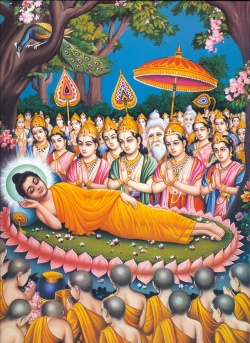Anāgāmi
In Buddhism, an anāgāmi (Sanskrit and Pāli for "non-returning") is a partially enlightened person who has cut off the first five chains that bind the ordinary Mind. Anagami-ship is the third of the Four stages of enlightenment.
Anagamis are not reborn into the human World after Death, but into the Heaven of the Pure Abodes, where only anagamis live. There they attain full Enlightenment (arahantship).
one cuts the first five fetters (orambhāgiyāni samyojanāni) to be a "non-returner" (anagami)
Anāgāmī: The Non-returner is a Noble Disciple Ariya-puggala on the 3rd stage of Nobility.
An Anagami (Non-returner) has completely eradicated the first five hindrances of the 10 hindrances to Enlightenment and never returns to earth or any other World system (planet, solar system). Such a person is reborn to a heavenly realm and attains Enlightenment from there.
There are 5 classes of Non-Returners, as it is said e.g. Pug. 42-46:
A being, through the disappearing of the 5 lower Mental chains Samyojana, reappears in a higher World amongst the devas of the Pure Abodes, Suddhāvāsa, and without returning from that World into the sense-sphere, he there reaches Nibbāna.
1. He may, immediately after appearing there in the Pure Abodes or before half of the Life-time, attain the Noble path for the overcoming of the higher Mental chains. Such a being is called one who reaches Nibbāna within the first half of the Life antarā-parinibbāyī.
2. Or, while living more than half of the lifetime there, or at the moment of Death, he attains the Noble path for the overcoming of the higher Mental chains. Such a being is called one who reaches Nibbāna after crossing half the Life-time upahacca-parinibbāyī.
3. Or, with effort he attains the Noble path for the overcoming of the higher Mental chains. Such a being is called one who reaches Nibbāna with exertion sasankhāra-parinibbāyī.
4. Or, without effort he attains the Noble path for the overcoming of the higher Mental chains. Such a being is called one who reaches Nibbāna without exertion asankhāra-parinibbāyī.
5. Or, after vanishing from the Heaven of the Aviha-gods see: Suddhāvāsa, he appears in the Heaven of the unworried atappa gods. After vanishing from there he appears in the Heaven of the clearly-visible sudassa gods, from there in the Heaven of the clear-visioned sudassī gods, from there in the Heaven of the highest Akanittha gods. There he attains the Noble path for the overcoming of the higher Mental chains. Such a being is called one who passes up-stream to the highest gods [[uddhamsota[Akanittha-gāmī]].
The Pali terms for the specific chains or Fetters (Pali: saṃyojana) of which an Anagami is free are:
- Sakkāya-diṭṭhi: Belief in self
- Vicikicchā: Skeptical Doubt
- Sīlabbata-parāmāsa: Attachment to rites and rituals
- Kāma-Rāga: Sensuous Craving
- Byāpāda: Ill will
The Fetters from which an Anagami is not yet free are:
- Rūpa-Rāga]]: Craving for fine-material existence (the first 4 jhanas)
- Arūpa-Rāga: Craving for immaterial existence (the last 4 jhanas)
- Māna: Conceit
- Uddhacca: Restlessness
- Avijjā: Ignorance
Anagamis are at an intermediate stage between sakadagamis and Arahants. Arahants enjoy complete freedom from the ten fetters.
Attaining the state of Non-returner is portrayed in the early texts as the ideal goal for laity.
